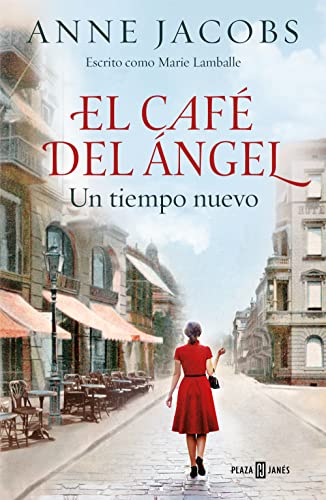It often happens that the irruption of a phenomenon as brutal as that of Anne jacobs in a specific literary market such as German (phenomenon equivalent to a Maria Duenas . in terms of theme and setting), it can be reproduced with even greater power when it arrives in replication in many other countries with a trilogy already materialized.
And that the case of Jacobs is not that of the marketing product emerged from nowhere. Because prior to the dissemination of her work under the definitive signature of her real name, Anne had already previously signed with novels signed with a variety of pseudonyms. Perhaps he did so with the idea of testing and refining his style and craft, to end up reappearing as the bestseller phenomenon that is already internationally.
The point is that, once those sales levels that advised its export have been reached, the arrival of the saga of the village of fabrics it is produced in a more pleasant way for readers, because the stories follow one after another in the new importing countries of the work.
Waiting for what is to come, I fix here my predilection in terms of the quality of what has been published between Germany and Spain by Anne Jabocs.
3 recommended books by Anne Jacobs
The village of fabrics
Perhaps it is not entirely objective in this first position, but the approach to characters whose lives extend to us among thousands of pages, always has that something special ... And this first part of the saga it is an unforgettable presentation.
The awakening of the twentieth century is probably one of the most literary stages of history in Europe, a continent that began the last century of the second millennium surrounded by constant evolution and a marked geopolitical and social upheaval.
Modernity loomed on the horizon with industrialization, development, technology…, in the same way that dark omens loomed over a reality that announced wars and that periodically shook the population with disasters of various kinds.
Writing intrahistories in this phase of our civilization is tempting. And this is how Anne Jacobs understood it in La Villa de las Telas, a novel that is already beginning to be a literary phenomenon in many readers of today's Europe who like to look into that mirror of detail into the past.
Because this is what this novel is, the story of a family saga back in 1913, and of all that microcosm of characters that shelters the millenary German city of Ausburg. The usual paradoxes between the solace life of the wealthy classes and the relentless struggle of the underprivileged in search of some remnant of the future.
The jump between social classes and love like a runaway magnet that can end up magnetizing people from very different backgrounds. Betrayals and hopes, emotion in abundance for fate that can wait for so many characters so well painted by the author.
The Melzers, rich and powerful in the Germany of the moment, have their service personnel where Marie enters, a young woman without a family but a worker, and with a great desire to carve out a future for herself ...
Paul Melzer must take the baton of command of the powerful family. But in his current youth he already guesses that he does not have the gifts for that iron command over goods and people that should be assumed to be a fit heir.
Marie and Paul. Shelter of dreams of one and the other. The magnet can end up attracting them. Love is capricious ...
But the Melzers are not what they are thanks solely to work and effort to raise their name. Every family has its secrets. The bigger a house is, the larger its basement must be to be able to house unspeakable secrets ...
The legacy of the village of fabrics
I suppose it will happen in almost every case where a story points to its end. The author must compensate for the knot of the new sequel with an orientation towards that apotheosis ending that closes the trilogy (in the event that there are no new installments ... Who knows?).
A third part like this that aroma of resolution always awakens, at the close of so many open pending issues, a farewell to characters and that combination between a closed ending and the feeling that life extends beyond a reading that has been able to accompany for months even ...
And this final work achieves that balance between rejoicing over a new story about the Melzers in which the author expands on new secrets and unsuspected dangers between love affairs, betrayals and a historical context that can both favor family businesses as soon as possible. to ruin any horizon of hopeful future, all of it, as I say, offset by the notion of the end that is coming, of the departure from the scene of unforgettable characters such as Marie, Paul or Elizabeth.
Only, before launching that last goodbye amid applause, the scene of their lives will be exposed to unforeseen events that at times will seem insurmountable ...
The daughters of the village of fabrics
That I place this second part in third place does not mean that it detracts from the whole. But as I say the beginnings and the endings have that I do not know how captivating, either by meeting the characters or by finally knowing what will become of them.
Despite not dealing with the plot of a generational evolution, as often happens in plots that address the evolution of sagas, in this case the links to the past are a well from which narrative foundations emerge towards those great secrets that justify events and that they are closing circles.
It is the year 1916, in the middle of the Great War. The wealthy Melzer family must face new challenges in a world that is falling apart at forced marches with the advance of the conflict, the general impoverishment and the call to help for every German of good, be it military or civilian with possibilities to care for the wounded or to develop logistics functions in favor of a German empire in need of collaboration at all levels.
The protagonism of the admired Marie, who in the first part already knew how to carve out her own destiny around love and firm will, acquires on this occasion the epic of the woman facing a war in which threats multiplied for them. And yet, we find a Marie determined to run a textile factory whose supply of work, prosperity and glory threatens total collapse.
Tragedy shakes her completely when she discovers that her beloved Paul Melzer has been taken prisoner. Faced with the impossibility of doing anything to free him, his role at the helm of the factory becomes a flight forward, a murky exercise of hope.
Time passes and Paul still does not return in the shadows of that hateful first great conflict that shook the whole of Europe. Marie always had that firmness capable of drawing everyone, that magnetism to which Paul himself succumbed, in love and fascinated.
But in his absence, a guy like Ernst von Klippstein haunts Marie with his gloomy considerations about Paul's fate and Marie's need to allow herself to be sheltered by him in order to survive what is to come, for her sake, for the survival of so much people around him and for the sake of everything that the Melzers raised for many years ...
Other recommended books by Anne Jacobs
The Angel Cafe. a new time
Jacobs' ability to insert unsuspected narrative tensions explodes in this plot without abandoning that point between intimacy and costumbrism that weaves most of his works. An interesting compendium that will surely captivate us all.
Wiesbaden, 1945. Young Hilde can hardly believe her luck: the war is over and the Café del Ángel has been miraculously saved. Hilde dreams of turning the family business back into the glamorous place that brought together artists and personalities of the city. But the first conflicts do not take long to arise when a beautiful young woman enters the cafe and introduces herself as her cousin, Luisa.
Who is this enigmatic woman who has struggled to get there from East Prussia? A rivalry grows between the two young women that threatens to poison the atmosphere of the café. Until both realize they have something in common: a secret from the war that has haunted them to this day...
The Angel Cafe. turbulent years
Without making a big leap in time, barely 6 years, the lives of the protagonists of this saga are once again shaken by the most unexpected circumstances. Because surviving a war has its own. And faced with this, something very singular has to happen to consider that once again it is time to row against the current to get ahead personally and in the business that took so much effort to maintain.
Wiesbaden, 1951. The Café del Ángel has had competition. Next to the traditional establishment of the Koch family, another more modern one has opened: the Café del Rey. While Hilde Koch tries in vain to convince her parents to modernize the premises, her great love, for which she has fought so hard, seems about to crack.
Things are not going any better for his brother August either. When he returns to Germany, after being a Russian prisoner of war, he begins to feel attracted precisely to a mysterious young Russian woman, whose arrival threatens to divide the family...






2 comments on "3 best books by Anne Jacobs"